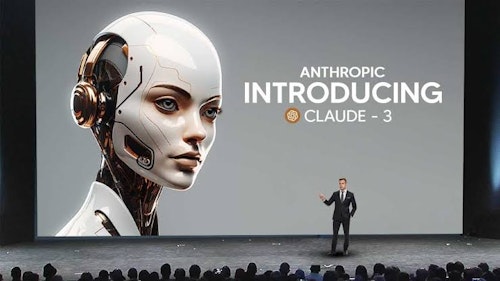Meet Claude 3, the most powerful AI in the world
Written By
Innocent BenjaminWriter | Editor | SEO expert
Joy EmehWriter| Editor| Content Strategist

This article discusses Claude 3, the artificial intelligence model that dethroned GPT-4 as the most powerful in the prestigious Chatbot Arena rating, and how it works.
Although it's conceivable that everything may shift again with the release of GPT-5 in a few months, there seems to be a new leader in the AI domain.
As a result, we will explain what Claude 3 is and where this artificial intelligence originated, as well as go over how it works, the many varieties, and what each one can achieve.
What is Claude 3?
Claude 3 is the most recent version of the Claude artificial intelligence model, developed by specialist firm Anthropic.
This is not a single model but rather a collection that includes Claude 3 Opus, Claude 3 Sonnet, and Claude 3 Haiku.
Claude 3 is therefore separated into three versions, each designed for a unique application and task. As a result, the AI can be tailored to certain capabilities, allowing it to be used in a variety of scenarios with flexibility.
The goal of this artificial intelligence model is not only to create a proficient and strong AI that stands out from its competitors. Anthropic also aims to create artificial intelligence that is consistent with human values and interests.
To do this, the firm is investing significant resources in ensuring that its models have a strong ethical foundation and therefore always function in a responsible and useful manner. It is guided by the ideals of openness, accountability, and trust.
This implies that AI will be able to identify related risks and take proactive steps to reduce them.
Thus, each model in this family has been designed not just to be safe but also to prevent abuse and unanticipated bad outcomes.
In reality, Claude 3 is structured not to accept requests that might cause damage or contradict its ethical ideals. Furthermore, it seeks to provide counsel and expertise that benefit society.
What versions of Claude 3 exist?
Claude 3 is separated into three varieties, the flagship being Claude 3 Opus, which aims to represent all that this AI is capable of while also being the most powerful. It is a comprehensive model with intelligence and adaptability that outperformed GPT.
This paradigm enables us to construct a natural language identical to that of a person, with flawless coherence and understanding. This then allows you to request that the AI create technical or colloquial documents, articles, and other types of material.
It can also answer inquiries on science, general culture, and other topics, as well as write and debug computer code in a variety of languages.
Furthermore, it enables you to perform productivity-enhancing automations, examine data upon request, and then challenge the data.
This is the model on which the firm hopes to differentiate itself, and it is built on strong ethical principles that prevent it from being exploited in bad ways.
Read also:
Then there's Claude 3 Sonnet, which aims to strike a compromise between performance and efficiency.
Thus, it aims to provide apps and use cases for the bulk of people without requiring such powerful devices as the former to perform.
This AI model has almost all of the same capabilities as its elder sibling, including code creation and natural language processing.
However, it is designed to demand fewer resources, a technological consideration, and so integrates into a variety of settings and infrastructures, from cloud-based platforms to local implementations.
There's also the lightness of Claude 3 Haiku, a version of the model designed to be utilised as efficiently as possible while taking less resources. It lacks several features in areas such as code creation, but it does contain all of those relevant to writing.
How to Use Claude 3
Claude is a free and premium artificial intelligence system that may be accessed via the claude.ai website. It has a feature that allows you to use it for free with certain limits, such as not having the most recent version of artificial intelligence and restricted prompts.
To unlock its full potential, you must subscribe to Claude Pro, which costs $20 per month. It is also a limited edition, with five times the number of prompts and capabilities as the free service, as well as additional features like priority access and model picker.